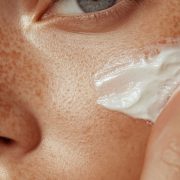Separating fact from fiction with our favorite skin care ingredient
Posted on April 15, 2025 Written by: 100% PURE®

If there’s one ingredient that consistently earns a top spot in skincare routines, it’s . Known for brightening dull complexions, fading , and defending against environmental stressors, vitamin C for skin is often considered a powerhouse — and for good reason. From beauty bloggers to dermatologists, everyone seems to agree on the glow-boosting magic of a good vitamin C serum.
But with all the hype, one question still lingers: Does vitamin C exfoliate?
In this article, we’ll break down exactly what vitamin C does, how it works on the skin, and whether it has any exfoliating power. Plus, we’ll share tips on how to use vitamin C with serum to get the most out of your routine — including how to pair it with exfoliants for maximum results. Whether you’re hunting for the best vitamin C serum for face or simply want to understand vitamin C serum benefits, we’ve got you covered.
Topical Effects of Vitamin C On Skin: Does Vitamin C Exfoliate?
Before we dive into whether vitamin C exfoliates, let’s explore — and why it’s earned its spot as a must-have in every skincare routine.
When applied topically, vitamin C serum for face delivers powerful antioxidant protection that helps neutralize free radicals caused by pollution, sun exposure, and stress. This helps prevent premature aging and supports your skin’s natural repair process. One of the biggest vitamin C serum benefits is its ability to brighten dull complexions and even out skin tone — making it a go-to for stubborn dark spots, sun damage, and post-acne marks.
But its glow-boosting benefits don’t stop there. Vitamin C for skin is a key player in collagen synthesis, which means it helps firm the skin and reduce the appearance of fine lines and wrinkles. Though it isn’t a chemical exfoliant in the traditional sense, regular use of vitamin C with serum can enhance skin texture and radiance by promoting cell turnover and keeping your complexion fresh and vibrant.
To amplify your results, reach for our — a radiance-boosting treatment infused with camu camu extract (a potent natural source of vitamin C), antioxidant-rich turmeric, and nourishing rosehip seed oil. Whether you’re already using the best vitamin C serum or just starting your glow-up journey, this mask delivers concentrated brightening and collagen-supporting benefits that take your routine to the next level.

Does Vitamin C Brighten Skin?
Vitamin C for skin is one of the most effective brightening ingredients in any skincare routine. When used consistently, a high-quality vitamin C serum for face can visibly improve the complexion by targeting dullness, dark spots, and uneven tone.
So, what does vitamin C do to brighten your skin? For starters, it supports healthy skin cell function and boosts collagen production, which can help thicken the dermis and reduce the appearance of fine lines. But perhaps even more impressive is its ability to inhibit melanin production. This means fewer dark spots, more even skin tone, and that radiant glow everyone’s after.
Pairing vitamin C and serum is a game-changer — especially when used daily. The antioxidant properties in help shield your skin from free radical damage while actively working to fade discoloration and enhance clarity. It’s a gentle yet powerful way to transform lackluster skin into a brighter, more youthful canvas.
To supercharge your nighttime routine, we recommend the . This deeply nourishing night cream delivers a concentrated dose of vitamin C along with other potent antioxidants, working overnight to replenish and renew your skin while you sleep. It’s the perfect complement to your daily vitamin C serum, helping you wake up to smoother, more luminous skin.
So yes, vitamin C serum benefits include brightening — but does vitamin C exfoliate?

Does Vitamin C Exfoliate Skin?
If you’ve ever wondered, “does vitamin C exfoliate skin?” — the short answer is no, but there’s more to the story.
While vitamin C for skin plays a huge role in achieving that radiant, healthy glow, it doesn’t work the same way traditional exfoliants do. (alpha hydroxy acids) or actively remove dead skin cells from the surface of the skin. Vitamin C serum, on the other hand, doesn’t slough off dead skin — but it does promote healthy cellular turnover, which supports the natural renewal of your skin.
So, while vitamin C with serum isn’t technically an exfoliant, it’s still a powerful ally in maintaining smooth, vibrant skin. By encouraging the production of new cells and stimulating collagen synthesis, vitamin C helps refresh your complexion over time — making it a perfect complement to exfoliating treatments.
To get the most out of your vitamin C serum for face, pair it with gentle exfoliation a few times a week. Removing that top layer of dead skin allows the vitamin C and serum combo to better penetrate and deliver those brightening, hydrating, and anti-aging benefits where your skin needs them most.
If you’re looking for an extra glow-up boost, our is a minimalist’s dream — made with just two skin-loving ingredients: vitamin C and hyaluronic acid. It’s perfect for enhancing hydration, fading dark spots, and restoring balance, especially during dry winter months.
So, does vitamin C exfoliate? Not exactly — but when used alongside proper exfoliation, this powerhouse ingredient can help you unlock the full potential of your skincare routine. Whether you’re using a , cream, or mask, incorporating the best vitamin C serum for your skin can make all the difference in your glow game.
The Best Way to Use Vitamin C in Your Skincare Routine
You want radiant, healthy skin—but you’re not sure if you’re using your vitamin C serum the right way. With so many products and steps to consider, it’s easy to feel overwhelmed or unsure if you’re actually getting the results you want.
The good news? Glowing, even-toned skin isn’t out of reach. With the right routine, you can unlock all the vitamin C serum benefits and finally see the transformation you’ve been looking for. Here’s your simple, effective plan:
1. Start with a Gentle Cleanser
Before your vitamin C for skin can work its magic, your skin needs a clean canvas. Use a gentle cleanser like our to remove dirt, oil, and impurities without stripping away your skin’s natural moisture. Clean skin = better absorption for the active ingredients to come.
2. Incorporate an Exfoliant (2–3 Times a Week)
To truly maximize your results, exfoliate a few times per week. This helps remove dead skin cells and preps the surface so your vitamin C with serum can better penetrate. Think of exfoliation as rolling out the red carpet for your actives.
3. Apply a Vitamin C Serum or Mask
Now it’s time for the star of your routine: vitamin C serum for face. Whether you choose a lightweight serum or a , this step helps brighten dullness, reduce hyperpigmentation, and support collagen production for firmer, smoother skin. If you’re not sure where to start, go for the best vitamin C serum for face—look for formulas that include additional antioxidants or skin-soothing ingredients like aloe or hyaluronic acid.
4. Follow with a Hydrating Moisturizer
To seal in the glow, follow up with a moisturizer. Hydration helps reinforce your skin’s barrier, allowing your vitamin C and serum combo to keep working throughout the day. It also prevents moisture loss and enhances softness and suppleness. Our is perfect for sealing in all those goodies while plumping the skin with hydration.
5. Use Sunscreen During the Day
No matter how powerful your serum is, UV damage can undo your progress. Applying a daily and helps preserve the results of your best vitamin C serum. This step is non-negotiable for long-term skin health.
Pro Tip: For best results, apply vitamin C serum for face in the morning. It acts like armor, shielding your skin from pollution, UV rays, and free radicals throughout the day.
By following this simple routine, you give your skin the support it needs to look brighter, smoother, and more radiant—no guesswork required.
Vitamin C Myths vs. Facts
Separating skincare fiction from citrus-powered truth
When it comes to vitamin C for skin, there’s no shortage of bold claims—and just as many misconceptions. Let’s clear the confusion so you can confidently get the most out of your vitamin C serum for face.
Myth: Vitamin C is an exfoliant
Fact: Vitamin C supports healthy skin turnover, but it doesn’t exfoliate like AHAs or scrubs. It preps your skin for better results when paired with true exfoliants.
Myth: The stronger the Vitamin C, the better
Fact: Concentration isn’t everything. A 20% serum isn’t automatically more effective than a 10% one—stability and formulation are key. The best vitamin C serum is the one your skin can tolerate and absorb well.
Myth: Vitamin C irritates all sensitive skin types
Fact: Some people may react to L-ascorbic acid, but gentler forms like magnesium ascorbyl phosphate are well-tolerated—even by sensitive or reactive skin.
Myth: You can’t use Vitamin C with other active ingredients
Fact: While you should be cautious combining it with retinol (especially in the same routine), vitamin C pairs beautifully with SPF and hydrating ingredients like hyaluronic acid for boosted results.
Myth: Vitamin C is only for brightening
Fact: Brightening is just the beginning. Vitamin C helps stimulate collagen production, softens fine lines, and improves signs of sun damage for a smoother, firmer complexion.
Pro Tip: If you’re feeling unsure about where to start, stick with a vitamin C serum for face that includes hydrating ingredients, and start slowly—your skin will thank you.
FAQs
Q: What does Vitamin C do for your skin?
A: Vitamin C is a powerhouse antioxidant that brightens dull skin, evens out skin tone, boosts collagen production, and helps reduce signs of aging like fine lines and sun damage. It also helps shield your skin from environmental stressors like pollution and UV exposure.
Q: Which is the best Vitamin C serum for face?
A: The best vitamin C serum for face is one that’s stable, well-formulated, and suits your skin type. Look for ingredients like ascorbic acid, magnesium ascorbyl phosphate, or sodium ascorbyl phosphate, ideally paired with antioxidants or hydrators like hyaluronic acid.
Q: Can Vitamin C help with acne scars?
A: Yes! Vitamin C supports healthy skin regeneration and helps fade post-inflammatory hyperpigmentation. Over time, a consistent vitamin C serum for face can visibly reduce the appearance of acne scars and brighten uneven tone.
Q: How often should I use a Vitamin C serum?
A: Most people can use vitamin C and serum daily—ideally in the morning, to protect skin from oxidative stress throughout the day. If you’re new to it or have sensitive skin, start 3–4 times a week and build up.
Q: Can I use Vitamin C and exfoliating acids together?
A: You can—but with care. Vitamin C and exfoliating acids (like AHAs or BHAs) are potent, so using them together may cause irritation for some. Try alternating them—acids at night, vitamin C in the morning—for glowing, balanced skin.




